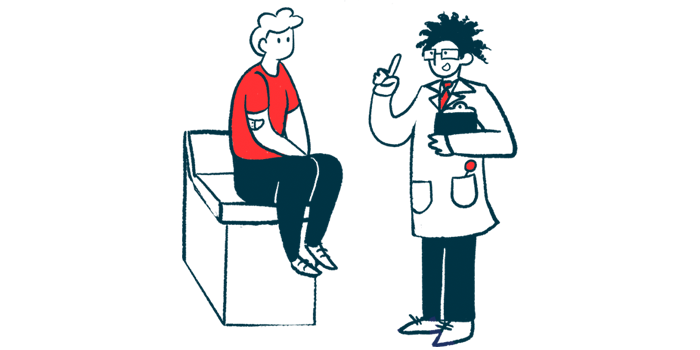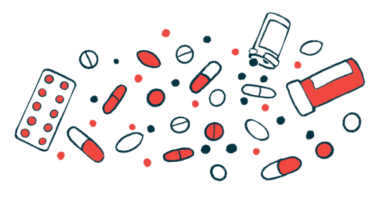Long-term benralizumab leads to EGPA remission: Real-world study
Therapy OK'd as add-on maintenance treatment for severe eosinophilic asthma

Long-term treatment with benralizumab — sold as Fasenra for a rare type of asthma — safely leads to clinical remission in up to two-thirds of people with eosinophilic granulomatosis with polyangiitis (EGPA), a real-world study shows.
“Across a [two]-year period of treatment, we have observed extremely positive outcomes with benralizumab in EGPA including the ability to achieve corticosteroid-free clinical remission in the majority of patients,” the researchers wrote in “Long-term Effectiveness of Benralizumab in Eosinophilic Granulomatosis with Polyangiitis,” which was published in The Journal of Allergy and Clinical Immunology: In Practice.
EGPA is the rarest type of AAV, a group of autoimmune disorders marked by damage and inflammation to small blood vessels that eventually affect tissues and organs. EGPA patients are rarely positive for ANCAs, the self-targeting antibodies that cause most AAV cases.
In EGPA, a type of immune cell called eosinophils build up in small blood vessels. While corticosteroids are the mainstay treatment for EGPA, their long-term use is linked with serious side effects and complications.
AstraZeneca’s benralizumab is approved as an add-on maintenance treatment for severe eosinophilic, or eosinophil-related, asthma in the U.S., Europe, Japan, and other countries. Severe eosinophilic asthma is a common complication of EGPA.
What does benralizumab do in EGPA?
The therapy targets the IL-5 receptor (IL-5R) protein on the surface of eosinophils, leading to their near complete elimination. Since it works like GSK’s Nucala (mepolizumab) — the only approved therapy for EGPA — several studies have tested its effects in the disorder.
A Phase 3 clinical trial called MANDARA (NCT04157348) showed benralizumab wasn’t inferior to Nucala at promoting disease remission in adults with hard to treat EGPA.
Here, researchers in the U.K. retrospectively analyzed data from a large group of adults with EGPA and severe eosinophilic asthma who started benralizumab between May 2018 and May 2022. The analysis included 70 patients (34 men, 36 women; mean age 49.4) on benralizumab for at least a year. Three-quarters of them completed two years.
About a third (34%) had been treated with anti-IL5 therapies — Nucala or Teva Pharmaceutical‘s Cinqair (reslizumab) — before switching to benralizumab. Prednisolone, a corticosteroid, was used daily by 80% of patients and 31% took additional immunosuppressive therapies.
The mean daily dose of prednisolone was significantly reduced after a year of benralizumab, from 13.1 to 2.4 mg/day. Most patients reduced their oral corticosteroids by at least half after one (82.1%) and two years (78%), and more than two-thirds no longer required them after one (67.9%) and two years (68.3%).
Clinical remission, or an absence of symptoms, was defined by a score of 0 in the Birmingham Vasculitis Activity Score (BVAS) and a daily prednisolone dose of 4 mg or lower.
The proportion of patients with a BVAS score higher than 0, indicating disease activity, significantly decreased from 77.1% at the study’s start (baseline) to 12.9% after a year and 7.5% after two years of benralizumab. When incorporating the reductions in daily corticosteroid use, 47 patients (67.1%) achieved clinical remission by a year and 36 (67.9%) did after two years.
Better lung function, asthma symptoms
Compared with patients who didn’t achieve clinical remission after a year, those who did had significantly better lung function and asthma symptoms that were significantly better controlled at baseline.
Lung function was assessed with % of predicted forced expiratory volume in one second (FEV1%), or how much air can be exhaled in a second after a deep inhaled breath. Asthma symptoms control was assessed with the self-reported Asthma Control Questionnaire 6 (ACQ6). Scores range from 0 (well controlled) to 6 (extremely poor controlled).
Those who achieved clinical remission were significantly less likely to have taken an anti-IL5 therapy (21.3% vs. 60.9%).
After benralizumab, FEV1% increased from a mean of 73.9 at baseline to 84.7 at one year and 85 at two years. Asthma symptoms were also better controlled, with ACQ6 scores falling from a mean of 1.6 at baseline to 1.1 at a year to 1 at two years.
More than half the patients (67.1%) were free of EGPA relapses after a year of treatment, which fell to 43.4% in the second year. ANCA-positive patients were more likely to have relapses than those without such antibodies, but these differences failed to reach statistical significance.
Of the 47 patients in remission within a year, 32 were classified as super responders, defined as patients in remission without any relapse and the need for corticosteroids in the previous year. By the end of the second year, 18 patients were super responders.
Benralizumab was well tolerated, without severe side effects.
“In this real-world setting of patients with EGPA, treatment with benralizumab was well tolerated and resulted in corticosteroid-free clinical remission for the majority of patients,” the researchers said.







